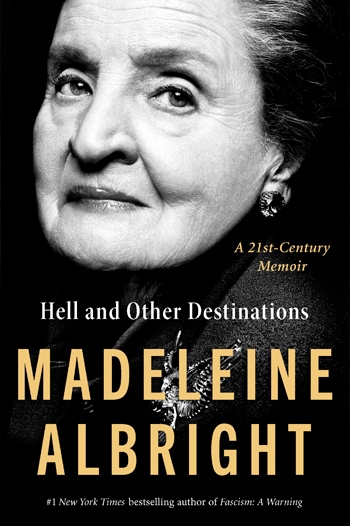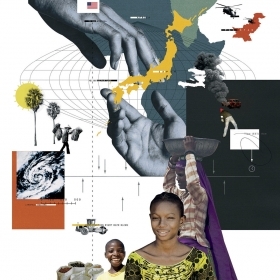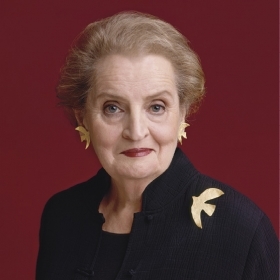To write seven memoirs worth reading requires lots of stories and a flair for telling them. Madeleine Korbel Albright ’59, who has lived a life of global scope at warp speed, displays both in abundance in her latest offering, Hell and Other Destinations: A 21st-Century Memoir. It covers her life after the U.S. State Department, where she served as secretary of state from 1997 to 2001. The themes of her previous books are all here: promoting democracy, empowering women, fighting genocide, managing crises, finding a voice, building a team, making friends, and suffering fools not so gladly. But the tone is more intimate—sometimes tragic, often hilarious, always resilient.
A surprise request for divorce after 23 years of marriage “nearly crushed me,” she writes. (Albright married three days after her Wellesley graduation and raised three daughters.) But it also awakened new capacities: “The irony is that had we not divorced, I doubt very much that I would ever have become secretary of state.” Nor would she have started buying her own jewelry, including the 200 signature pins featured in Book No. 4, Read my Pins: Stories from a Diplomat’s Jewel Box. As the Clinton administration’s UN ambassador, Albright criticized Saddam Hussein for ignoring Security Council resolutions. In response, a poem published in the Baghdad press referred to her as an “unparalleled serpent.” Soon after, wearing a serpent pin, Albright met with Iraqi diplomats in New York —a signaling device that has continued throughout her career.
A lively sense of humor runs through even the darkest moments in her story, including what she now views as a mistaken decision to serve on the board of the New York Stock Exchange. On a conference call, she heard one of her new board colleagues comment, “The last thing we need is some former secretary of state coming in here and acting like Saint Francis of Assisi.” She replied: “Excuse me, I am Madeleine Albright and I am on the phone and can hear everything you say.”
“I didn’t know whether the adventures I would have in my ‘afterlife’ would last for three years, or five, or 10, or perhaps longer,” she writes of her time post-State Department. “I did know that the sooner I started and the faster I went, the more I could do.”
Of course, one of possible outcomes of afterlife is hell, hence the title of this book. The cost of finding a voice, and Albright’s sorrow over the prospect of losing it, is something any reader will recognize, even if they never face the challenge of relearning how to pump gas into a car you have to drive yourself, as Albright did after returning to private life. Her answer to wrenching change, aging, and mortality is, simply, move faster.
“Sum up my life? Not yet, I am still counting. Until I am carried out, I will carry on,” she concludes.
Chaddock was for many years the Washington political editor of the Christian Science Monitor.







We ask that those who engage in Wellesley magazine's online community act with honesty, integrity, and respect. (Remember the honor code, alums?) We reserve the right to remove comments by impersonators or comments that are not civil and relevant to the subject at hand. By posting here, you are permitting Wellesley magazine to edit and republish your comment in all media. Please remember that all posts are public.